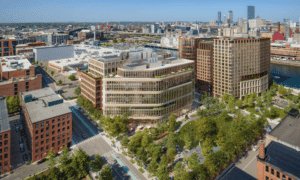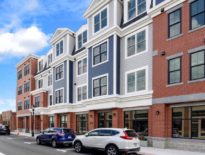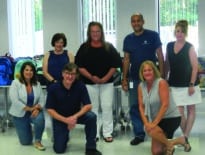Related Beal’s newly-approved 1.1 million-square-foot Channelside project addresses critiques of past Seaport District developments, setting aside space for affordable artist housing and studios, a 900-seat waterfront amphitheater and publicly-deeded park space.
Boston Planning & Development Agency directors approved the project at 244-284 A St., replacing a former Gillette parking lot with two office-lab buildings and a residential tower, after more than two years of review.
The future of the 6.5-acre site was the focus of more than 100 public and community meetings, and touched on hot-button issues raised during the Seaport District’s development boom including housing affordability, coastal resiliency and publicly-accessible parks and open space.
But it was Channelside plans for artist housing and performance space that generated most of the comments during Thursday’s meeting, as dozens of local artists spoke in favor of the project.
“There’s really been an approach that has been the most collaborative I have seen, and the city should approach each project like this,” said Rhiannon Hayes, a Fort Point resident and member of the institutional advisory group that reviewed the project. “The result is something that’s really going to benefit the neighborhood.”
Artists drawn to Fort Point lofts by affordable rents in past decades have faced displacement in recent years as office towers and luxury housing turned the Seaport District into a sought-after address. The neighborhood still has affordable artist coops at 249 A St. and 300 Summer St. and affordable apartments for artists at 15 Channel St.
In August, responding to comments from the public and city officials, Related Beal agreed to increase the affordable housing component from 17.5 to 20 percent of the 340 apartments, while reserving 75 percent of the income-restricted units, or 51 units, for city-certified artists.
The amphitheater for outdoor performances “is going to be absolutely transformational to Fort Point Channel,” filmmaker Raber Umphenour said. Developers agreed to contribute $3.7 million for public art exhibits, programming and infrastructure.
Related Beal also agreed to deed a 1.5-acre section of the property to the Boston Park and Recreation Department, ensuring that the park space will remain permanently accessible to the public. The designs by architects KPF and Halvorson Design retain a corridor of park space across the property from A Street to the channel, and are designed to connect to a future park corridor stretching east to the South Boston Bypass Road.
The development is the second pending life science project in Greater Boston with a major cultural component.
BioMed Realty will break ground this month on a new research facility for Takeda Pharmaceuticals in Cambridge’s Kendall Square, including a 400-seat theater that will host performances in partnership with nonprofit Global Arts Live.
BPDA directors approved a combined 1.8 million square feet of development projects at Thursday’s monthly meeting.
Three South End buildings at 65 Wareham St. will be redeveloped as a five-story, 79,600-square-foot life science facility by Transom Real Estate and Camber Development, while preserving the existing facade.
At 24 Drydock Ave. in South Boston, Cronin Group received approval for an eight-story, 234,000-square-foot life science building that includes office and training space for the neighboring Boston Ship Repair facility.
In Dorchester, a vacant parcel at 120 Bowdoin St. will be redeveloped as 38 apartments by developer Shanti Acquisition LLC.
Directors also approved new zoning for Allston’s Western Avenue corridor that reflects demand for higher-density mixed-use development and includes plans for upgraded sidewalks, dedicated bus lanes and bicycle lanes.









